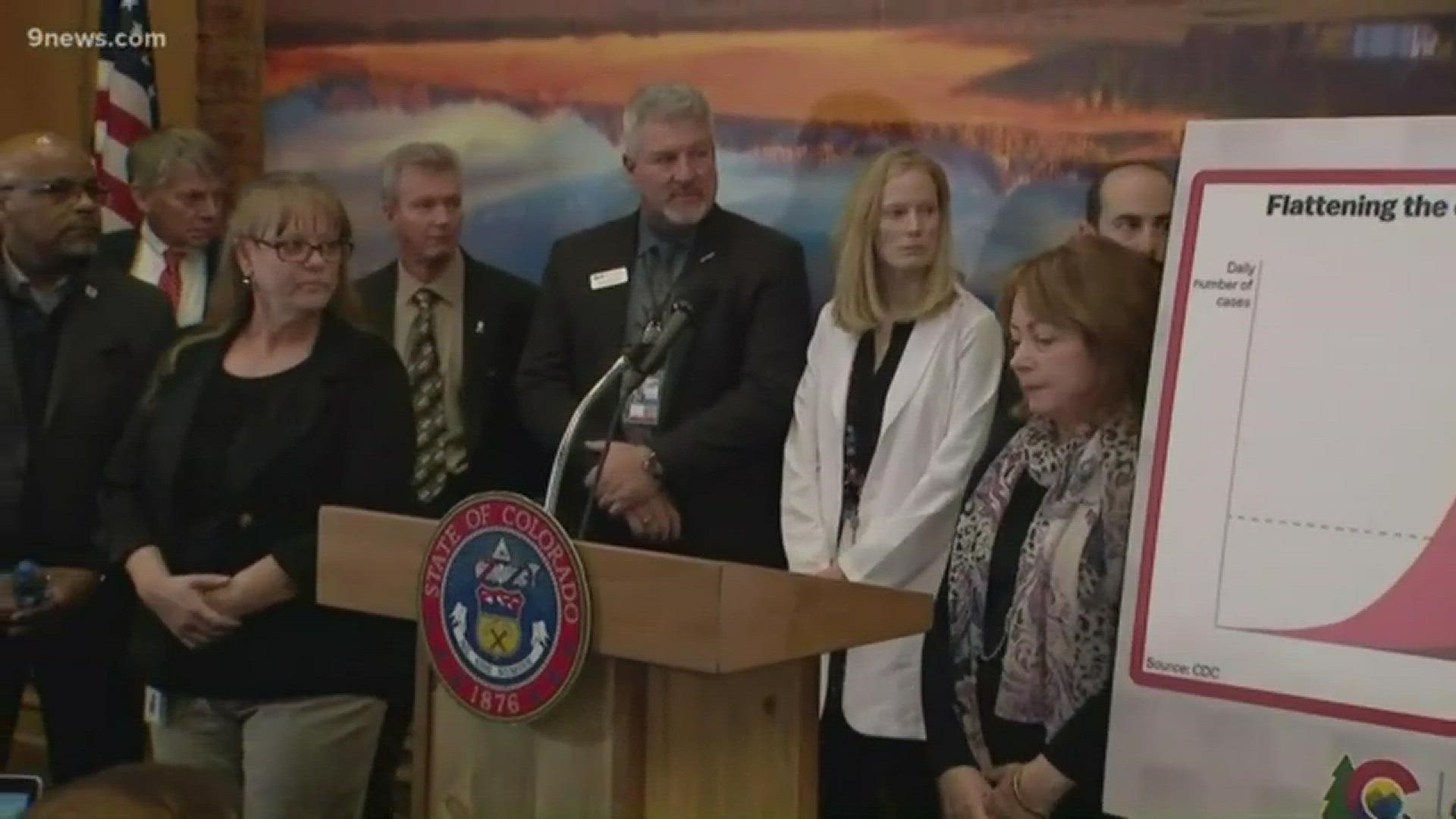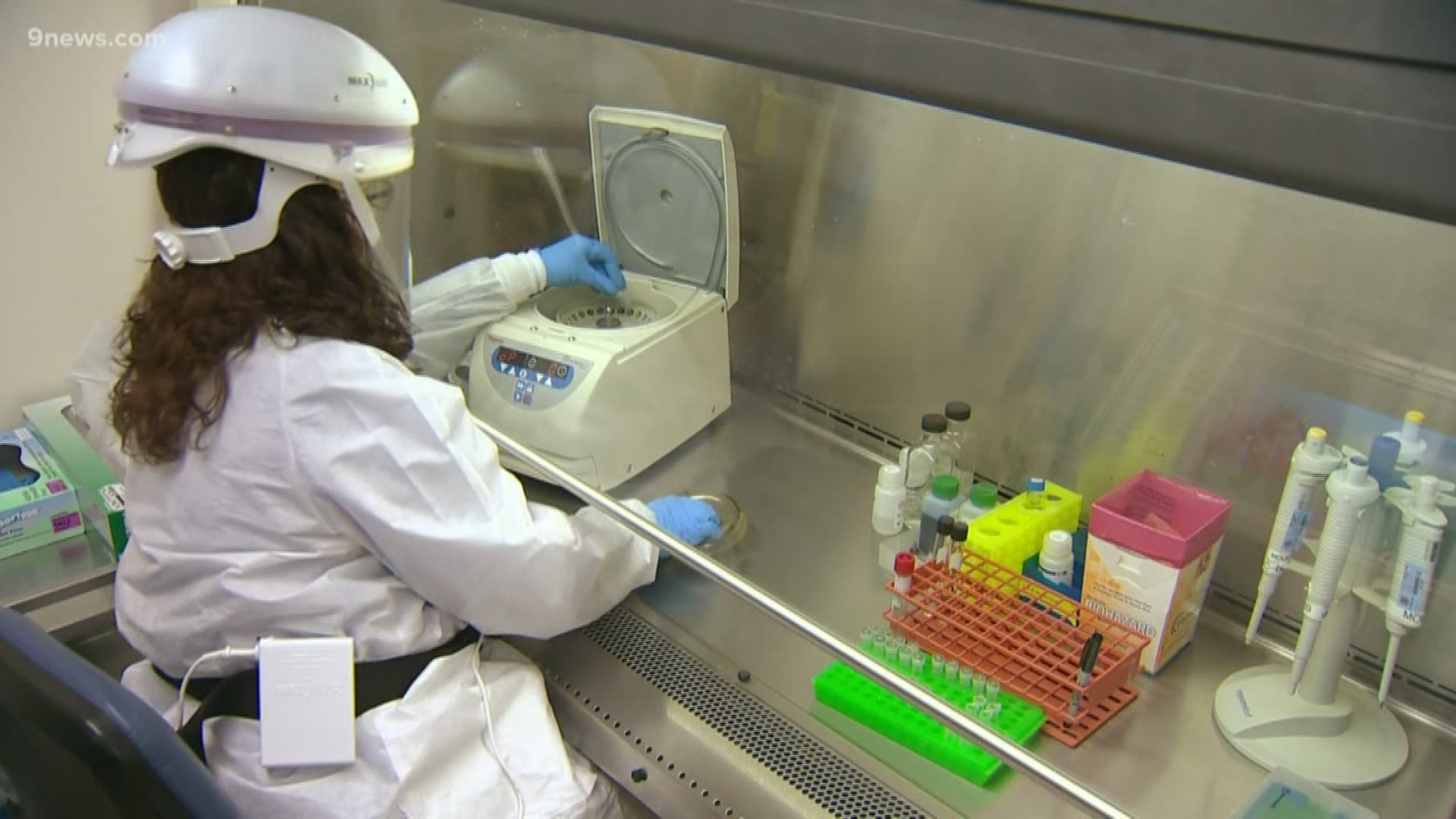DENVER — In an update Friday, Colorado Gov. Jared Polis outlined the state's efforts to help slow the spread of the coronavirus in our state, which includes recommending that large public events be limited and bringing in reinforcements for the healthcare system.
The first cases of the virus popped up in Colorado on March 5; one week later, the number of confirmed cases in the state topped 70, according to health officials.
"This will be an enormous strain on our systems and our workforce," Polis said. "We need to focus on moving forward, and we need all hands on deck."
Below is a look at what Polis said the state is doing as of Friday to slow the spread of the virus and ease its impact on the healthcare system.
Social distancing
Polis said he strongly suggests events with 250 or more people across the state be canceled unless they put a plan in place to allow for social distancing.
"Generally, in any outdoor activity, your group is more than six feet from other groups," Polis said. "That's how the spacing works. It's not one individual and 6 feet, another individual. It's the group that you're with. It could be two people, or six people or eight people, and then we want to recommend 6 feet between the next group."
Other local communities, such as Eagle and Pitkin counties, have enacted more strict policies regarding events.
Polis also urges churches to discourage those in the at-risk populations from attending services.
"This is a shared recognition that the public health consequences, the human consequences need to remain our primary focus," Polis said. "This is how we weather the storm [to] protect our most vulnerable and prevent a catastrophic overload of the healthcare care system."
Confirmed cases
As of March 13, there were 72 cases in Colorado, and eight of those patients were in the hospital. Three people were in critical condition, according to Polis. He also announced there was community spread in the Denver metro area in addition to the high country.
RELATED: Colorado COVID-19 cases
He urged everyone not to focus on those numbers and said that many other Coloradans likely have the virus and don't know it since so few people have been tested.
"Many Coloradans will get this virus. You're gonna get it or a friend is going to get it or a family member. Somebody you know is going to have coronavirus," Polis said. "They are very likely to have minor symptoms and have to remain isolated in their home. Our goal is to spread it out and protect our most vulnerable population — our seniors and those whose lives are at risk."
Testing
Anyone with flu-like symptoms should self-isolate and call first before showing up at any medical facility to avoid potentially infecting patients at those locations, according to Polis.
He said everyone with flu-like symptoms should get tested so that people don't return to work or school too soon while still contagious.
"What we want to avoid here is people who recover after three or four days not knowing whether they recovered from the coronavirus or a cold, and they return to work on that fourth or fifth day when they're likely to still be contagious," Polis said.
Polis said 90% of those tested by the state had negative results.
The drive-up testing site in Lowry at 8100 E. Lowry Blvd., Denver, CO 80230 is expected to resume Saturday. It was supposed to open Friday, but was postponed due to inclement weather.
"The protection gear is not safe in wet weather," Polis said.
It will take place from 12-2 p.m. and the testing center will only be able to handle the first 100 to 150 people in line.
Providers such as UCHealth, Kaiser Permanente, and Stride Community Health Center have the ability to do testing.
Any medical provider with a relationship with LabCorp or Quest Diagnostics can test, but be sure to contact your provider ahead of time because many providers have centralized sites for testing due to safety precautions.
Support for health care workers
Polis said he's taking action to support the health care system that's already stretched to the limit so that they can respond to a potential surge in patients due to COVID-19.
"Part of the problem is again as healthcare workers are diagnosed, they will be out of the workforce for 14 days, so we need to backfill those positions," Polis said.
He took the following actions to support the healthcare system
- He signed an executive order allowing the Department of Regulatory Agencies (DORA) to immediately license people to practice medicine in Colorado who are currently living in Colorado but licensed in another state.
- They're contracted with dozens of nurses from out-of-state to bring them to the areas that have been hardest hit.
- CDPHE authorized every EMT and paramedic in the state to administer the test for the virus.
- Asked doctors and nurses not currently in the workforce with an active license to reconnect with a prior employer to see if they can rejoin the workforce.
- Activated the Colorado National Guard with more than a dozen media being trained to administer testing. They're also helping train others to get other mobile testing sites open.
- Reached out to Anschutz Medical Campus to check about availability of students.
Outdoors
Polis said that outdoor activities should be considered safe because during most of those activities people are typically a safe distance apart.
He said ski resorts were taking steps to keep everyone safe by making sure different groups of people were not seated together on a closed gondola.
"What does this mean? If you have a group of four or five skiers, you're already exposed to that group," Polis said. "We're not concerned about that. What we're concerned about is not being with other groups."
He also urged people to get outdoors during their extended spring breaks.
"Outdoor recreation is a great thing to do at this time," he said. "Going hiking, going biking. If you're frustrated because your community center is closed for your kids, I know we are, what can you do? Generally, with the spring weather, hiking, outdoor recreation, all of those things are safe and healthy to do with your family."
Internet access
With some schools and colleges moving to online learning, Polis addressed the need for internet access, especially for low-income families.
He announced that Comcast is reinforcing its Internet Essentials program to help families deal with the crisis.
Beginning Monday:
- Speeds will increase from 15/2 MBPS to 25/3 for all new and existing customers, and will become the speed of the service going forward.
- New families who connect will get 60 days of internet service for free.
The Internet Essentials program is normally available to all qualified low-income households for about $10 a month.
SUGGESTED VIDEOS: COVID-19 Coronavirus


